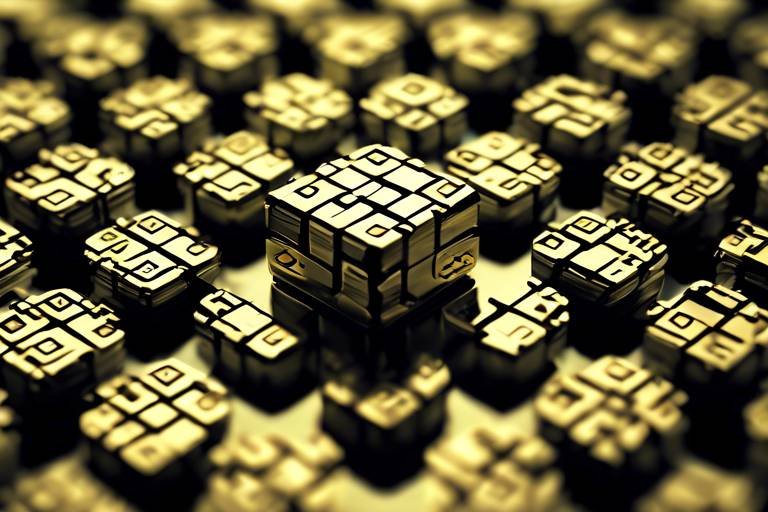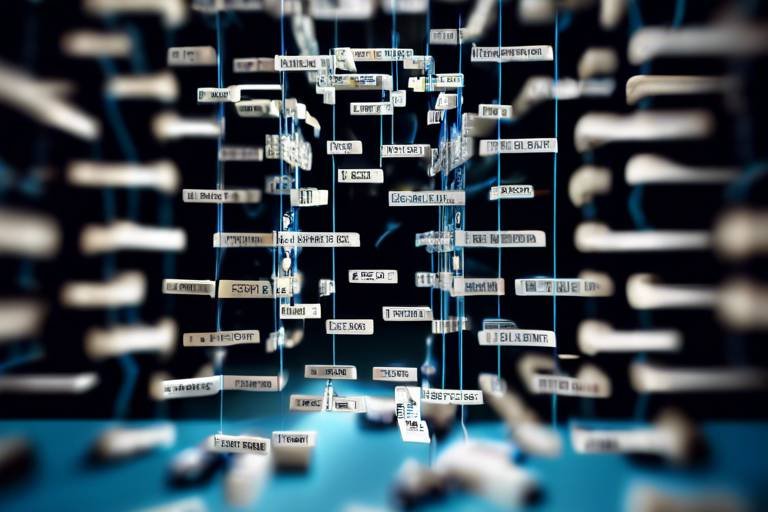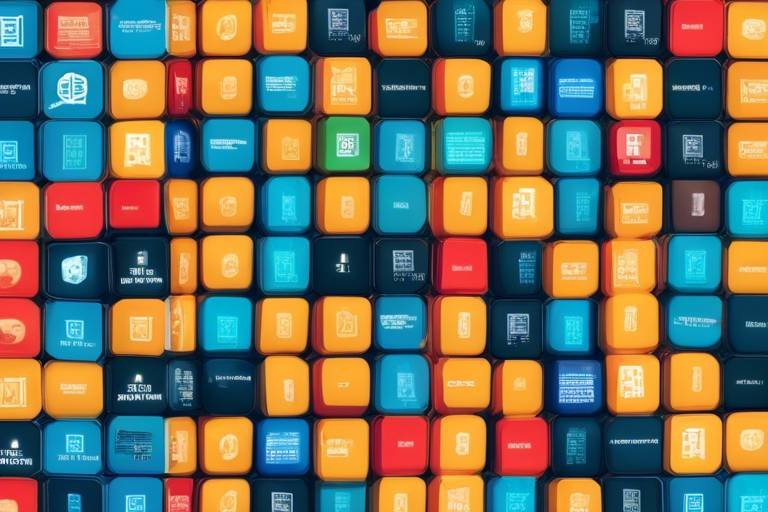How Blockchain is Transforming Data Monetization
In today's digital landscape, data is often referred to as the new oil. Just as oil revolutionized economies in the past, data has become a critical asset for businesses aiming to drive growth and innovation. However, the challenge lies in how to effectively monetize this data. This is where blockchain technology comes into play, offering a transformative approach to data monetization that is both decentralized and secure. By leveraging blockchain, companies can not only protect their data but also create new revenue streams by sharing it in a controlled manner. Imagine a world where individuals have full ownership of their data, and businesses can access valuable insights without compromising privacy—this is the promise of blockchain in the realm of data monetization.
Data monetization involves converting data into a viable revenue stream. It's not just about collecting data but understanding its value and finding ways to leverage it effectively. Businesses today are inundated with vast amounts of data, from customer interactions to market trends. The challenge is to sift through this data to extract meaningful insights that can drive decision-making and strategy. Companies can monetize data in various ways, such as selling it to third parties, using it to enhance products and services, or even creating entirely new business models. The importance of data monetization cannot be overstated; it is essential for maintaining a competitive edge in an increasingly data-driven world.
To understand how blockchain impacts data monetization, it's essential to grasp the fundamental principles of this technology. At its core, blockchain is a decentralized ledger that records transactions across multiple computers. This decentralization ensures that no single entity has control over the entire network, which enhances security and transparency. Each transaction is encrypted and linked to the previous one, creating an immutable chain of data. This means once data is recorded on the blockchain, it cannot be altered or deleted, which is a significant advantage for businesses looking to maintain the integrity of their data. Moreover, the transparency offered by blockchain allows all participants to verify transactions, fostering trust among users.
Decentralization is one of the most revolutionary aspects of blockchain technology. It empowers individuals and organizations to take control of their data without the need for intermediaries. In traditional data systems, companies often rely on centralized databases managed by third parties, which can lead to issues such as data breaches and lack of transparency. With decentralization, data ownership shifts back to the individual, allowing for greater control over how their data is shared and monetized. This shift not only enhances privacy but also opens up new avenues for individuals to profit from their data.
The benefits of decentralization in data monetization are numerous:
- Increased Security: By eliminating a single point of failure, decentralized systems are less vulnerable to hacks and data breaches.
- Reduced Costs: Without intermediaries, transaction costs can be significantly lowered, enabling more efficient data exchanges.
- Enhanced Privacy: Individuals have more control over their personal information, leading to a more trustworthy data environment.
These advantages contribute to the development of effective data monetization strategies, making blockchain an attractive option for businesses looking to innovate.
Despite its many benefits, decentralization is not without challenges. Scalability is a significant concern, as many blockchain networks struggle to handle a high volume of transactions quickly. Additionally, regulatory issues can pose obstacles, as governments around the world are still grappling with how to regulate decentralized systems. Businesses must navigate these challenges carefully to implement successful decentralized data solutions.
Smart contracts are another crucial element of blockchain technology that enhances data monetization. These self-executing contracts have the terms of the agreement directly written into code, which means they can automatically enforce and execute transactions when certain conditions are met. This automation reduces the need for intermediaries, thereby lowering costs and increasing efficiency. For instance, a company could set up a smart contract to automatically pay users for their data once it's accessed, ensuring a seamless and trustworthy transaction process.
Many industries are already harnessing the power of blockchain for data monetization. From healthcare to finance, organizations are finding innovative ways to utilize blockchain technology to enhance the value of their data.
In the healthcare sector, blockchain is revolutionizing data sharing and privacy. By providing a secure and transparent way to manage patient data, healthcare providers can improve patient outcomes while also monetizing anonymized data for research purposes. For example, a hospital could use blockchain to securely share patient records with researchers, ensuring that patient privacy is maintained while still allowing valuable data insights to be extracted.
The financial industry is rapidly adopting blockchain technology to enhance data monetization. By enabling transparent and secure transactions, blockchain reduces the risk of fraud and creates new revenue streams. Financial institutions can leverage blockchain to offer innovative products, such as tokenized assets, which can be traded on decentralized exchanges, providing new opportunities for investment and profit.
What is data monetization?
Data monetization is the process of turning data into revenue through various methods, such as selling it or using it to improve products and services.
How does blockchain enhance data security?
Blockchain enhances data security through decentralization, encryption, and immutability, making it difficult for unauthorized parties to alter or delete data.
What are smart contracts?
Smart contracts are self-executing contracts with the terms directly written into code, facilitating automated transactions without the need for intermediaries.
What industries are benefiting from blockchain?
Industries such as healthcare and finance are leveraging blockchain for data monetization, improving data sharing and creating new revenue streams.

The Concept of Data Monetization
Data monetization is not just a buzzword; it’s a powerful strategy that businesses are increasingly adopting to turn information into revenue. In today's digital age, data is often referred to as the new oil. It’s valuable, abundant, and can be refined into actionable insights that drive growth and innovation. But what exactly does it mean to monetize data? Simply put, it involves transforming raw data into a product or service that can generate income. This process can take various forms, from selling data directly to third parties, to using data analytics to enhance customer experiences and improve operational efficiencies.
In the competitive landscape of modern business, companies that effectively leverage data can gain a significant edge. They can make informed decisions, anticipate market trends, and tailor their offerings to meet customer needs. For instance, consider a retail company that collects data on customer purchasing habits. By analyzing this data, the company can identify which products are most popular, adjust inventory accordingly, and even create personalized marketing campaigns. This not only increases sales but also enhances customer satisfaction, creating a win-win situation.
Moreover, data monetization can take on various forms, including:
- Direct Sales: Selling data sets to interested parties, such as market researchers or advertisers.
- Analytics Services: Offering insights derived from data analysis as a service to clients.
- Improved Decision-Making: Utilizing data to inform business strategies and operational improvements.
However, it’s important to note that the journey of data monetization is not without its challenges. Companies must navigate issues related to data privacy, compliance with regulations, and the ethical implications of data usage. For example, the General Data Protection Regulation (GDPR) in Europe has set strict guidelines on how personal data can be collected and used. Companies need to ensure they are compliant to avoid hefty fines and damage to their reputation.
In conclusion, data monetization is a crucial aspect of contemporary business strategy. It allows organizations to unlock the potential of their data, creating new revenue streams while enhancing customer experiences. As we delve deeper into the intersection of blockchain and data monetization, we’ll uncover how this revolutionary technology can address some of the challenges faced by businesses today, paving the way for a more decentralized and equitable data economy.

Blockchain Basics
Understanding blockchain technology is crucial if you want to grasp its transformative role in data monetization. At its core, blockchain is a distributed ledger technology that allows data to be stored across a network of computers, making it decentralized and secure. Imagine a digital notebook that everyone can see and write in, but no one can erase or alter past entries. This is the essence of blockchain: a permanent record that enhances trust and accountability.
One of the fundamental principles of blockchain is decentralization. Unlike traditional databases that are controlled by a single entity, blockchain operates on a peer-to-peer network. This means that every participant in the network has access to the entire database and can verify transactions independently. As a result, the need for intermediaries, such as banks or data brokers, is significantly reduced. This shift not only empowers individuals and organizations to take control of their own data but also paves the way for a more transparent and equitable data economy.
Decentralization is more than just a buzzword; it's a game-changer. By distributing data across multiple nodes, blockchain enhances data ownership. This means that individuals can manage their own data without relying on third parties. For instance, think about how you currently share your personal information with various online platforms. With blockchain, you could maintain control over your data and decide when, how, and with whom to share it. This shift not only enhances privacy but also fosters a sense of ownership and trust.
The benefits of decentralization are manifold. Here are some key advantages:
- Increased Security: Data stored on a blockchain is encrypted and immutable, making it nearly impossible for hackers to alter information.
- Reduced Costs: By eliminating intermediaries, businesses can significantly cut down on transaction fees and operational costs.
- Enhanced Privacy: Individuals can control their own data, reducing the risk of data breaches and misuse.
These benefits contribute to effective data monetization strategies by creating a secure environment where data can be exchanged freely and efficiently.
However, decentralization is not without its challenges. Businesses may face obstacles such as scalability issues, where the blockchain needs to handle a growing number of transactions without compromising speed or efficiency. Additionally, regulatory concerns often arise, as governments and institutions grapple with how to manage decentralized systems. These challenges require innovative solutions and collaborative efforts to overcome.
Another exciting aspect of blockchain is the use of smart contracts. These are self-executing agreements where the terms are written directly into code. Smart contracts automate data transactions, ensuring that once conditions are met, transactions occur seamlessly. This not only enhances trust but also reduces the potential for disputes, making them an essential tool in the world of data monetization.

Decentralization Explained
Decentralization is a fundamental principle of blockchain technology that fundamentally alters how we think about data ownership and control. Imagine a world where you are the sole owner of your data, free from the clutches of large corporations that often profit from your information without your consent. Sounds liberating, right? This is precisely what decentralization offers. By distributing data across a network of computers rather than storing it in a single, central location, blockchain empowers individuals and organizations to maintain control over their own data.
In a centralized system, data is typically managed by a single entity. This means that if that entity decides to change the rules, restrict access, or even sell your data, you have little to no recourse. On the other hand, decentralized systems allow data to be stored in a manner that is transparent and immutable. Each participant in the network has a copy of the data, and any changes must be agreed upon by the majority. This creates a level of trust that is often absent in traditional data management systems. The beauty of decentralization lies in its ability to eliminate the need for intermediaries, thereby reducing the risk of data manipulation and breaches.
One of the most significant advantages of decentralization is that it enhances data ownership. Individuals can control who accesses their data and how it is used. This is especially crucial in an era where data privacy concerns are at an all-time high. With decentralization, users can choose to monetize their data directly, receiving compensation for its use without having to rely on third-party platforms. This not only fosters a sense of ownership but also opens up new revenue streams for individuals.
However, it’s important to note that decentralization isn’t a panacea. While it offers numerous benefits, it also introduces challenges that must be addressed. For instance, the scalability of decentralized networks can be a concern. As more users join the network, the system can become slower and less efficient, which can hinder the user experience. Additionally, regulatory challenges arise as governments grapple with how to manage and oversee decentralized systems. The lack of a central authority can complicate compliance with existing laws and regulations.
In conclusion, decentralization is a powerful concept that has the potential to revolutionize data ownership and monetization. By enabling individuals to take control of their data, blockchain technology opens the door to a more equitable and transparent data economy. As we continue to explore the implications of decentralization, it’s essential to balance its benefits with the challenges it presents, ensuring that we create a system that is not only innovative but also secure and user-friendly.
- What is decentralization in blockchain? Decentralization in blockchain refers to the distribution of data across a network, allowing individuals to have control over their data without relying on a central authority.
- How does decentralization enhance data ownership? It allows users to manage their data directly, deciding who can access it and how it can be monetized, thus fostering a sense of ownership.
- What challenges does decentralization face? Challenges include scalability issues and regulatory concerns, as decentralized systems can complicate compliance with laws.

Benefits of Decentralization
Decentralization is more than just a buzzword in the tech world; it's a fundamental shift in how we think about data ownership and management. Imagine a world where individuals have complete control over their personal information, free from the clutches of centralized authorities. This is the promise of decentralization, and it brings with it a plethora of benefits that can transform the landscape of data monetization.
One of the most significant advantages of decentralization is increased security. By distributing data across a network of nodes rather than storing it in a single location, the risk of data breaches diminishes. Hackers find it much harder to attack decentralized systems since there is no central point of failure. This enhanced security not only protects sensitive information but also builds trust among users. When people know their data is secure, they are more likely to share it, creating new opportunities for businesses to monetize this information.
Another compelling benefit is reduced costs. Traditional data management often involves multiple intermediaries, each taking a cut of the profits. With decentralization, these middlemen can be eliminated, allowing businesses to retain a larger share of the revenue generated from data monetization. This streamlined approach not only enhances profitability but also makes it easier for smaller organizations to compete in the data economy.
Moreover, decentralization significantly enhances privacy. In a decentralized model, individuals have the power to control who accesses their data and under what circumstances. This level of control is crucial in today’s digital age, where data privacy concerns are at an all-time high. By empowering users to manage their data, businesses can foster a more loyal customer base, as consumers are increasingly drawn to brands that prioritize their privacy.
In addition to these benefits, decentralization encourages innovation. When data is owned and managed by individuals rather than corporations, it opens up a world of possibilities for new applications and services. Developers can create decentralized applications (dApps) that utilize user data in novel ways, leading to innovative solutions that can drive growth in various industries. The collaborative nature of decentralized networks fosters creativity, as individuals contribute to a shared pool of resources.
To sum it up, the benefits of decentralization are substantial and multifaceted. By enhancing security, reducing costs, improving privacy, and fostering innovation, decentralization lays the groundwork for a more equitable and efficient data monetization landscape. As businesses begin to recognize these advantages, we can expect to see a significant shift toward decentralized data solutions.
- What is decentralization? Decentralization refers to the distribution of data and authority away from a central governing body, empowering individuals to manage their own data.
- How does decentralization enhance security? By spreading data across multiple nodes, decentralization reduces the risk of a single point of failure, making it harder for hackers to compromise the system.
- Can decentralization reduce costs for businesses? Yes, by eliminating intermediaries, businesses can retain a larger share of revenue generated from data monetization.
- What role does privacy play in decentralization? Decentralization gives individuals control over their data, allowing them to decide who can access it and under what conditions, enhancing privacy.
- How does decentralization encourage innovation? With individuals managing their own data, new applications and services can emerge, fostering creativity and growth in various industries.

Challenges of Decentralization
While decentralization in blockchain technology offers remarkable advantages, it also presents a set of challenges that can hinder its widespread adoption. One of the most significant challenges is scalability. As more users join a decentralized network, the amount of data that needs to be processed increases exponentially. This can lead to slower transaction times and higher costs, making it less appealing for businesses that require quick and efficient data transactions. Imagine trying to have a conversation in a crowded room; the more people there are, the harder it is to hear and be heard. That’s the scalability issue in a nutshell.
Another hurdle is the regulatory landscape. Decentralized systems often operate in a legal gray area, which can create uncertainty for businesses. Different countries have varying regulations regarding data privacy, cryptocurrency, and blockchain technology, leading to confusion and potential compliance issues. Companies may find themselves navigating a complex web of laws that can change unexpectedly, much like trying to follow a map that keeps shifting as you move.
Moreover, security concerns persist despite the inherent security features of blockchain. While decentralization reduces the risk of a single point of failure, it can introduce new vulnerabilities. For instance, decentralized applications (dApps) can be susceptible to bugs in their code, which can be exploited by malicious actors. This is akin to having multiple doors in a house; while it provides more access points, it also means more locks to potentially pick.
Lastly, the user experience in decentralized systems can be less intuitive compared to centralized solutions. Many users are accustomed to the simplicity of traditional platforms, and the complexity of blockchain can be a barrier to entry. For example, managing private keys and wallets can be daunting for those unfamiliar with the technology. If you think about it, it’s like switching from a familiar, easy-to-use smartphone to a complicated, feature-rich device that requires a steep learning curve.
In summary, while decentralization holds incredible promise for data monetization, it is not without its challenges. Addressing scalability, regulatory issues, security vulnerabilities, and user experience will be crucial for businesses looking to harness the full potential of decentralized data solutions. As the technology matures and solutions to these challenges are developed, we can expect to see a more robust and efficient decentralized data economy emerge.
- What is decentralization in blockchain?
Decentralization in blockchain refers to the distribution of data across a network, eliminating the need for a central authority to manage and control the data. This empowers users to have greater control over their information. - What are the main benefits of decentralization?
Decentralization enhances security, reduces costs, and improves privacy, making it an attractive option for data monetization strategies. - What challenges does decentralization face?
Some challenges include scalability issues, regulatory uncertainties, security vulnerabilities, and a potentially complex user experience. - How can businesses overcome the challenges of decentralization?
By investing in scalable solutions, staying informed about regulatory changes, and focusing on user-friendly interfaces, businesses can navigate the challenges of decentralization effectively.

Smart Contracts and Data Monetization
Smart contracts are the unsung heroes of the blockchain world, acting as the digital equivalent of a vending machine. Just as a vending machine dispenses snacks when you insert the correct amount of money, smart contracts execute transactions automatically when predefined conditions are met. This functionality is particularly revolutionary in the realm of data monetization, where trust and efficiency are paramount. Imagine a scenario where a data provider wants to sell their data to a buyer. Traditionally, this would involve numerous intermediaries, lengthy negotiations, and potential disputes. However, with smart contracts, the process becomes seamless and automated, allowing for real-time transactions.
One of the most significant advantages of smart contracts in data monetization is the enhancement of trust. When data transactions are governed by code, the terms are transparent and immutable. This means that both parties can be assured that the agreed-upon conditions will be met without the risk of manipulation or fraud. For instance, a healthcare provider can share patient data with a researcher through a smart contract that automatically compensates the provider every time the data is accessed. This not only incentivizes data sharing but also ensures that the provider is fairly compensated for their asset.
Moreover, smart contracts can facilitate complex agreements that involve multiple parties. For example, in a data marketplace, a single dataset might be sold to various buyers. Smart contracts can manage these transactions, ensuring that each buyer receives their access while appropriately distributing payments to the data owner. This level of automation not only saves time but also significantly reduces operational costs, making data monetization more accessible for businesses of all sizes.
However, while smart contracts offer numerous benefits, they are not without their challenges. The coding of these contracts must be flawless, as even a minor error can lead to significant financial losses. Additionally, the legal status of smart contracts is still evolving, which can create uncertainty for businesses looking to implement them. Companies must navigate these complexities carefully to harness the full potential of smart contracts in their data monetization strategies.
In summary, smart contracts are transforming the landscape of data monetization by providing a reliable, efficient, and automated way to conduct transactions. They empower data owners by ensuring they are compensated fairly while simultaneously enhancing trust and reducing costs. As the technology matures, we can expect to see even more innovative applications of smart contracts, paving the way for a new era of data-driven revenue generation.
- What are smart contracts? Smart contracts are self-executing contracts with the terms of the agreement directly written into code on the blockchain.
- How do smart contracts enhance data monetization? They automate transactions, increase trust through transparency, and reduce the need for intermediaries.
- What are the challenges of using smart contracts? Challenges include potential coding errors and the evolving legal status of smart contracts.
- Can smart contracts be used in multiple industries? Yes, smart contracts can be applied across various sectors, including healthcare, finance, and supply chain management.

Real-World Applications
In today's rapidly evolving technological landscape, blockchain is not just a buzzword; it's a powerful force reshaping how industries approach data monetization. Various sectors are already harnessing the capabilities of blockchain to transform their operations, enhance data value, and create new revenue streams. The beauty of blockchain lies in its versatility, allowing organizations to innovate in ways previously thought impossible. For instance, in healthcare, blockchain is being utilized to manage patient records securely, enabling patients to control their data while allowing healthcare providers to access necessary information without compromising privacy. This not only enhances patient trust but also opens up avenues for monetizing anonymized health data.
Similarly, the financial industry is witnessing a seismic shift due to blockchain technology. Traditional banking systems often suffer from inefficiencies, high costs, and a lack of transparency. Blockchain addresses these issues by providing a decentralized ledger that enhances transparency and reduces the risk of fraud. Financial institutions are now able to track transactions in real-time, making it easier to identify discrepancies and prevent fraudulent activities. Moreover, blockchain facilitates the creation of new financial products that can be monetized, such as decentralized finance (DeFi) platforms that offer lending and borrowing services without the need for intermediaries.
To further illustrate the impact of blockchain on data monetization, let's take a look at some key sectors leveraging this technology:
| Industry | Application | Benefits |
|---|---|---|
| Healthcare | Secure patient data sharing | Enhanced privacy, improved data management |
| Finance | Real-time transaction tracking | Increased transparency, reduced fraud |
| Supply Chain | Tracking product provenance | Improved traceability, reduced counterfeiting |
| Advertising | Data ownership and monetization | Better targeting, reduced ad fraud |
Another noteworthy application of blockchain can be found in the advertising industry. Advertisers are increasingly faced with challenges related to data privacy and ad fraud. Blockchain enables users to maintain control over their data, allowing them to decide how and when their information is used. This not only empowers consumers but also enhances the accuracy of targeted advertising, leading to improved ROI for businesses. By creating a transparent environment where all parties can verify the authenticity of data, blockchain is paving the way for a more efficient and trustworthy advertising ecosystem.
As we move forward, the potential for blockchain in data monetization is immense. With ongoing innovations and increasing adoption across various sectors, businesses are beginning to realize the benefits of integrating blockchain into their operations. The future holds exciting possibilities for creating a more decentralized and secure data economy, where individuals and organizations can truly capitalize on the value of their data.
- What is data monetization? Data monetization is the process of using data to generate revenue, often by selling insights or access to data.
- How does blockchain enhance data security? Blockchain utilizes cryptography and decentralization to secure data, making it more difficult for unauthorized parties to access or alter information.
- Can small businesses benefit from blockchain? Absolutely! Small businesses can leverage blockchain for cost-effective solutions in data management, enhancing transparency and trust with customers.
- What are smart contracts? Smart contracts are self-executing contracts with the terms of the agreement directly written into code, facilitating automated transactions without intermediaries.

Healthcare Innovations
In the ever-evolving world of healthcare, blockchain technology is not just a buzzword; it’s a game-changer. Imagine a system where patient data is not only secure but also easily accessible to authorized parties, all while maintaining the utmost privacy. Sounds too good to be true? Well, it’s becoming a reality thanks to blockchain. By harnessing the power of this innovative technology, healthcare providers can streamline operations, enhance patient care, and create new avenues for data monetization.
One of the most significant innovations in healthcare is the establishment of decentralized patient data management systems. Traditionally, patient records are stored in centralized databases, making them vulnerable to data breaches and unauthorized access. However, with blockchain, every piece of data is encrypted and stored across a distributed network, ensuring that it is not only secure but also immutable. This means that once a record is created, it cannot be altered or deleted without a trace, providing an unparalleled level of trust in the data.
Moreover, blockchain facilitates interoperability among various healthcare systems. This means that different healthcare providers can securely share patient information without the need for a centralized authority. For instance, if a patient visits multiple specialists, each of them can access the same up-to-date medical history, which can significantly improve diagnosis and treatment plans. This interconnectedness not only enhances patient outcomes but also reduces the costs associated with redundant tests and procedures.
Another exciting development is the concept of patient-controlled data sharing. Patients can now have full control over who accesses their data and when. With blockchain, individuals can grant temporary access to their medical records to healthcare professionals, researchers, or insurance companies, ensuring that their privacy is respected while still enabling valuable data monetization opportunities. This not only empowers patients but also fosters a new level of trust between patients and providers.
However, the integration of blockchain in healthcare is not without its challenges. Issues such as regulatory compliance, the need for standardization, and the requirement for widespread adoption among healthcare providers must be addressed. Nonetheless, the potential for blockchain to revolutionize data monetization in healthcare is immense. As more organizations begin to recognize the value of secure and efficient data management, we can expect to see a surge in innovative applications that enhance patient care and drive revenue growth.
In summary, blockchain is paving the way for a more secure, efficient, and patient-centric healthcare system. By enabling decentralized data management, fostering interoperability, and empowering patients, this technology is not just improving healthcare but also creating new opportunities for data monetization. As we look to the future, the healthcare industry stands on the brink of a revolution that promises to transform how we think about data and its value.
- What is blockchain technology? Blockchain is a decentralized digital ledger that records transactions across many computers, ensuring that the recorded data cannot be altered retroactively.
- How does blockchain enhance data security in healthcare? By decentralizing data storage and encrypting patient information, blockchain significantly reduces the risk of data breaches and unauthorized access.
- Can patients control their own medical data with blockchain? Yes! Blockchain technology allows patients to manage who has access to their medical records, providing them with greater control over their personal information.
- What are the challenges of implementing blockchain in healthcare? Some challenges include regulatory compliance, the need for standardization across systems, and encouraging widespread adoption among healthcare providers.

Finance and Blockchain
The financial industry is undergoing a seismic shift, and at the heart of this transformation is blockchain technology. Imagine a world where transactions are not only faster but also more secure and transparent. That's the promise of blockchain in finance. By eliminating the need for intermediaries like banks and clearinghouses, blockchain is paving the way for a more efficient financial ecosystem. But how exactly does this work? Let's break it down.
One of the most significant advantages of blockchain in finance is its ability to enhance transparency. Every transaction recorded on a blockchain is visible to all participants in the network. This level of transparency not only builds trust among users but also significantly reduces the chances of fraud. In a traditional banking system, transactions can be opaque, often leaving customers in the dark about fees and processing times. With blockchain, however, every transaction is recorded in a tamper-proof ledger, making it easy to track and verify.
Moreover, blockchain technology drastically reduces the time it takes to process transactions. Traditional banking systems can take days to settle cross-border payments, often involving multiple banks and layers of bureaucracy. With blockchain, these transactions can be completed in a matter of minutes or even seconds. This speed is particularly beneficial for businesses that rely on quick cash flow, allowing them to operate more efficiently and respond to market changes promptly.
In addition to speed and transparency, blockchain also opens up new revenue streams for financial institutions. By utilizing smart contracts, banks and other financial entities can automate various processes, from loan approvals to insurance claims. Smart contracts are self-executing contracts with the terms directly written into code, eliminating the need for manual intervention. This not only reduces operational costs but also minimizes human error, leading to more reliable and efficient services.
However, it's essential to acknowledge that the integration of blockchain into the financial sector is not without its challenges. Regulatory concerns loom large, as governments and financial authorities grapple with how to manage this disruptive technology. Compliance with existing laws while fostering innovation is a delicate balance that must be achieved. Furthermore, the issue of scalability cannot be overlooked. As more users join the network, the system must be able to handle increased transaction volumes without sacrificing speed or security.
Despite these challenges, the potential of blockchain in finance is too significant to ignore. Financial institutions are already experimenting with various blockchain applications, from cryptocurrencies to decentralized finance (DeFi) platforms. By embracing this technology, they can not only enhance their operational efficiency but also offer innovative products and services that meet the evolving needs of their customers.
In conclusion, the intersection of finance and blockchain is an exciting frontier that holds great promise. As we move forward, it will be fascinating to see how this technology continues to reshape the financial landscape, creating new opportunities and challenges along the way. Are you ready to embrace the future of finance?
- What is blockchain technology? Blockchain is a decentralized digital ledger that records transactions across many computers securely and transparently.
- How does blockchain improve financial transactions? It enhances speed, reduces costs, and increases transparency by eliminating the need for intermediaries.
- What are smart contracts? Smart contracts are self-executing contracts with the agreement directly written into code, allowing for automated processes.
- What challenges does blockchain face in finance? Key challenges include regulatory issues, scalability, and the need for widespread adoption.
Frequently Asked Questions
- What is data monetization?
Data monetization is the process of converting data into revenue. Businesses analyze and leverage their data to create value, drive growth, and enhance decision-making. Essentially, it's about finding ways to profit from the information they collect.
- How does blockchain technology impact data monetization?
Blockchain technology transforms data monetization by providing a decentralized platform that enhances security, transparency, and control over data. This means businesses can manage their data without relying on intermediaries, which can lead to more direct and profitable transactions.
- What are the benefits of decentralization in data monetization?
Decentralization offers several advantages, including increased security against data breaches, reduced costs by eliminating middlemen, and improved privacy for users. By empowering individuals and organizations to own their data, it fosters a more equitable data economy.
- What challenges does decentralization present?
While decentralization has its perks, it also comes with challenges like scalability issues, regulatory hurdles, and the need for robust technological infrastructure. Businesses must navigate these obstacles to successfully implement decentralized data solutions.
- What are smart contracts and how do they relate to data monetization?
Smart contracts are self-executing agreements with the terms written directly into code. They facilitate automated data transactions and enhance trust in data monetization by ensuring that agreements are executed only when predetermined conditions are met, minimizing the risk of fraud.
- Can you give examples of real-world applications of blockchain in data monetization?
Absolutely! Various industries are adopting blockchain for data monetization. For instance, in healthcare, blockchain improves patient data management and privacy. In finance, it enhances transparency, reduces fraud, and creates new revenue streams, showcasing the technology's versatility.



















